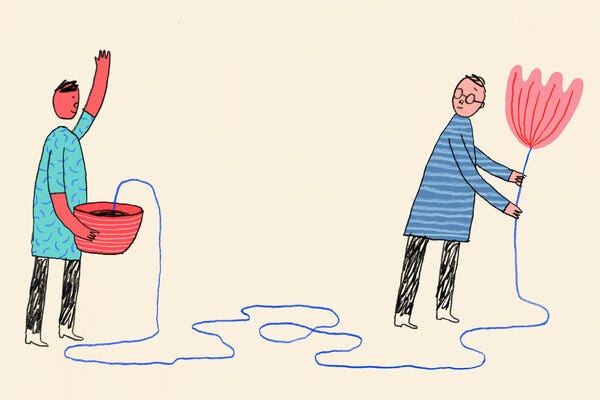When Everything Becomes Negotiation: Why Modern Couples Are Exhausted
Why modern couples are exhausted: we expect one person to be everything—best friend, lover, co-parent, and adventure partner. How to navigate these impossible contradictions.
Here's what nobody tells you about modern love: we've accidentally created the most demanding relationship experiment in human history, and we're all the lab rats.
For the first time in our species' existence, the survival of the family unit depends almost entirely on one thing—the emotional and erotic connection between two people. No arranged marriages for economic security. No extended families to share the load. No clear gender roles dictating who does what. Just two people, staring at each other across the breakfast table, expected to be absolutely everything to one another.
The poet Octavio Paz wrote about love as a "double flame"—sexuality raising the red flame of eroticism, which feeds the tremulous blue flame of love. Beautiful metaphor. Impossible reality. Because here's the cruel joke: the very things that create security in a relationship—predictability, reliability, knowing your partner inside and out—are precisely what kills desire. And the things that fuel desire—mystery, novelty, a bit of danger—threaten the security we crave.
We want our partners to be our best friend, our passionate lover, our co-parent, our financial partner, our emotional support system, and our source of personal growth. Between 6 and 8 PM, we want reliability and partnership. Between 8 and 10 PM, we want mystery and seduction. From the same person. In the same body. It's like asking someone to be both your mother and your mistress, your priest and your provocateur.
The Great Negotiation Fatigue
Everything today is "one big freaking negotiation," and it's exhausting.
Who picks up the kids? Who initiates sex? Who remembers anniversaries? Who gets to be tired? Our grandparents knew their roles—oppressive as they often were, they at least provided a script. We've torn up the script and improvised our way into a psychological traffic jam where everyone thinks they're right because nobody knows what the rules are anymore.
This shows up most dramatically in the bedroom. Sexuality isn't just biology anymore—it's identity. It's not something that happens to us; it's something we curate, define, and attach meaning to. No pressure there.
The most telling research finding? Women consistently report being most aroused not by seeing their partner turned on, but by being the turn-on. They need to feel legitimately allowed to focus on themselves. But how can you focus on yourself when you're managing everyone else's needs, schedules, and emotions?
The Parenthood Plot Twist
Then children arrive, and everything gets wonderfully, terrifyingly complicated. That small bundle of joy you're gazing at with complete absorption? That's exactly how you used to look at your partner. Now your erotic attention has a new target, and everyone's confused about where that leaves the relationship.
One parent becomes the "frontline" caregiver—usually developing different sensory thresholds, different boundaries, a different relationship with interruption. The other parent can read the newspaper while chaos erupts. These aren't personality flaws; they're adaptations. But they create distance right when you need connection most.
Here's the revolutionary idea nobody wants to hear: having an erotic connection with your partner should be on the list of things your children need. Not because you're selfish, but because children thrive when their parents are thriving. Yet most parents would rather feel guilty about taking time for their relationship than actually take that time.
The Vulnerability Paradox
Modern relationships demand unprecedented emotional sophistication. We're expected to navigate conversations our great-grandparents never had, about needs they never thought to articulate. Men are told to be vulnerable but not weak, emotionally available but not needy, sensitive but still masculine. Women are told to be independent but not threatening, sexual but not slutty, maternal but not sexless.
The result? A lot of people standing in front of mirrors, thinking they're looking at their partner. We project our own unresolved needs onto each other, then wonder why nothing feels quite right.
The Way Forward
The solution isn't to lower our expectations—it's to get more realistic about managing paradox. Some tensions can't be resolved, only navigated. Security and adventure will always be in creative tension. The goal isn't to eliminate that tension but to dance with it.
Start with this: you pick a person, and with that person, you create a story. Sometimes you'll be recruited for a play you didn't audition for. The key is learning to edit well—editing your story, your expectations, and yes, sometimes editing yourself.
The future of love isn't about finding someone who completes you. It's about finding someone willing to negotiate the impossible contradictions of modern intimacy with curiosity instead of contempt, humor instead of hostility.
After all, we're all making this up as we go along. We might as well make it up together.
The conversations that matter most often happen not on dates, but in comfortable spaces where people can share their relational histories without performance or judgment. Use this as your primer, then go cook up those conversations in your own relationships.



Hmmm. The negotiations began when women woke up to their exhaustion which preceded modern times.